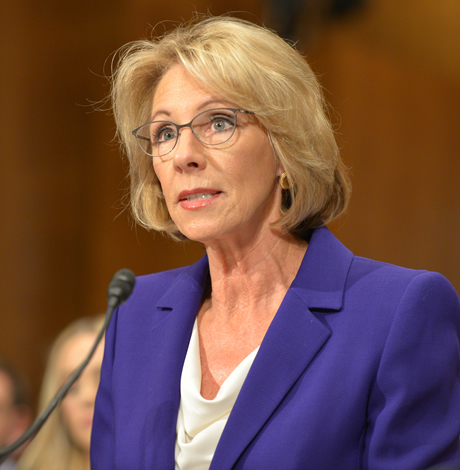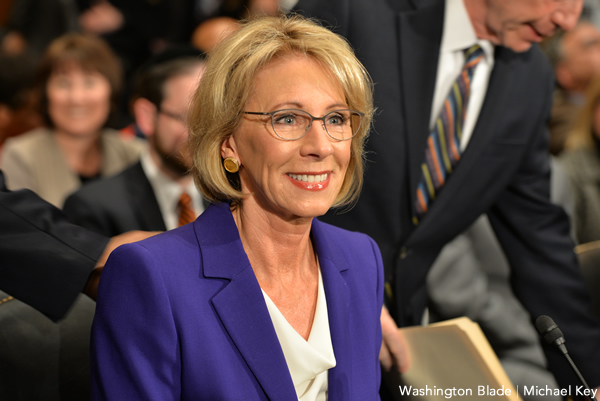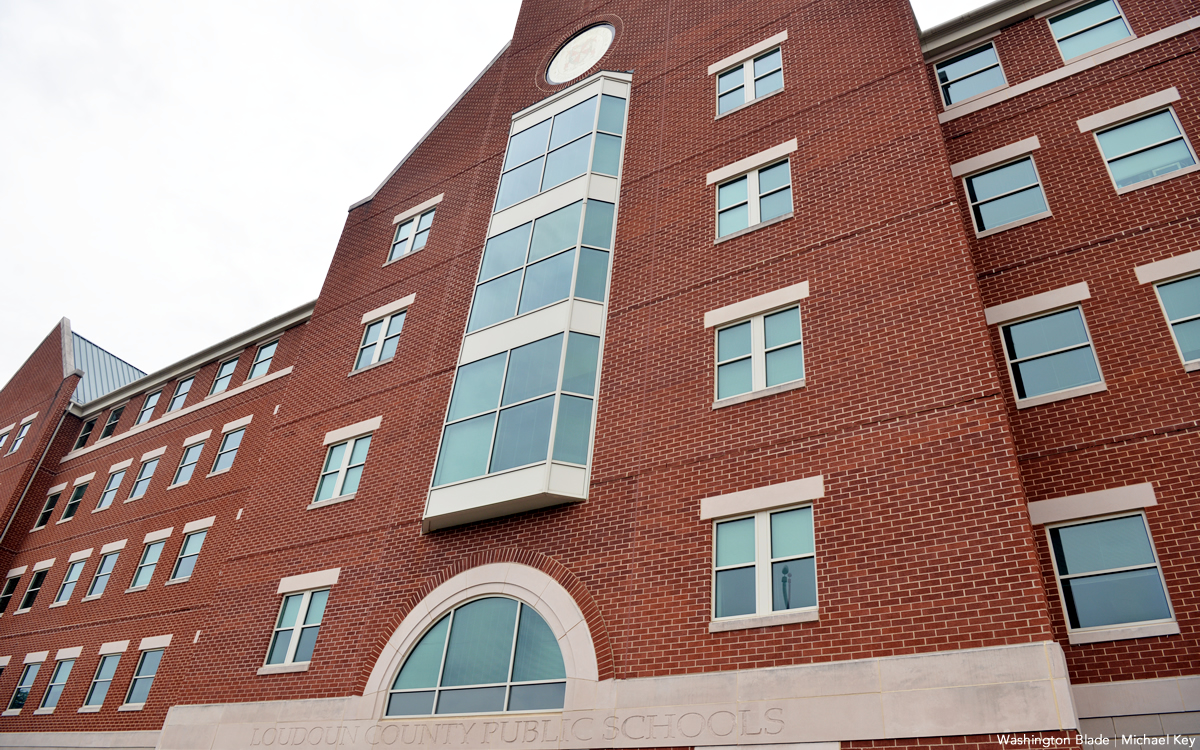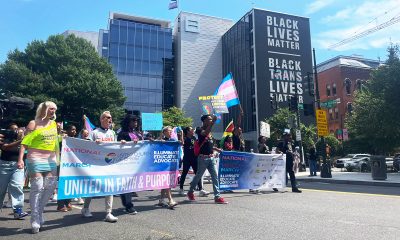News
DeVos: It’s OK if states discriminate against LGBT students
Education sec’y also won’t denounce racial discrimination


Betsy DeVos refused to denounce discrimination against LGBT students.
(Blade file photo by Michael Key)
Under a grilling during a congressional hearing Wednesday, Education Secretary Betsy DeVos refused to say she’ll speak out against discrimination against LGBT students — or even students experiencing racial discrimination.
Rep. Katherine Clark (D-Mass.) pressed DeVos during a House Appropriations subcommittee hearing on Lighthouse Christian Academy, a private school in Indiana the lawmaker says is the recipient school voucher money, but may not admit students from families with “homosexual or bisexual activity” or “practicing alternate identity.”
Clark asked DeVos, who’s advocating a budget that calls for a $250 million increase in school voucher funds, if she’ll “stand up that this school will be open to all students.”
DeVos first dodged the question, saying she’ll like to defer to earlier comment from lawmaker, and still refused to denounce the policy when asked to draw a line on state flexibility and reject money for schools discriminating on the basis of sexual orientation, race or special needs.
“For states who have programs that allow for parents to make choices, they set up the rules around that,” DeVos said.
Pressed further by Clark on whether the Education Department would withhold school vouchers on any situation regarding discrimination, DeVos again refused to answer.
“The Office of Civil Rights and our Title IX protections are broadly applicable across the board,” DeVos said. “But when it comes to parents making choices on behalf of their students…”
Davis interrupting by saying “this isn’t about parents making choices, this is about use of federal dollars,” and pressed DeVos who provided a non-answer about flexibility.
“So, if I understand your testimony,” Davis responded, “I want to make sure I get this right. There’s no situation of discrimination or exclusion that if a state approved it for its voucher program, that you would step and say that’s now how we’re going to use our federal dollars? There’s no situation, if the state approved it, that you would put the state flexibility over our students? Is that your testimony?”
DeVos began to say the situation was “hypothetical,” but Davis responded the situation was real and pointed to Lighthouse Christian Academy. At this point, the Republican chair of the committee informed Davis her time had expired.
“The bottom line is we believe that parents are the best equipped to make choices for their children’s schooling and education decisions, and too many children today are trapped in schools that don’t work for them,” DeVos said. “We have to do something different, we have to do something different than continuing a top-down, one-size-fits-all approach, and that is the focus, and states and local communities are best equipped to make these decisions and framework on behalf of their students.”
Davis, seemingly exasperated, concluded, “I am shocked that you could not come up with one example of discrimination that you would stand up for students.”
David Stacy, government affairs director for the Human Rights Campaign, was among those denouncing DeVos for refusing to denounce anti-LGBT discrimination.
“Taxpayer funds should never be used to discriminate against LGBTQ students, and it is shocking and disappointing that Secretary DeVos won’t make this basic commitment,” Stacy said. “Secretary DeVos has failed again to stand up for all students and ensure every child is able to receive an education free from harassment and discrimination.”
Federal law against discrimination in schools also prohibits charter and private schools from discriminating against students. Title VI of the Civil Rights Act of 1964 prohibits discrimination on the basis of race, color, and national origin for any school accepting federal funds, and Title IX of the Education Amendments of 1972 prohibits discrimination on the basis of sex for any school accepting federal funds. There is an exemption in Title IX for religious schools, but not for charter or secular private schools.
DeVos, who was narrowly confirmed by the Senate, has been a controversial figure and despised by charter school opponents for her support for school vouchers.
Earlier this year, DeVos and U.S. Attorney General Jeff Sessions revoked Obama-era guidance barring schools from discriminating against transgender students or denying them access to the restroom consistent with their gender identity.
Media reports indicated she resisted the change, but she ultimately agreed to it. Afterwards, DeVos met with transgender students and a trio of LGBT advocacy groups at the Education Department.
Sarah Kate Ellis, CEO of GLAAD, also denounced DeVos and said the education secretary was “turning a blind eye to LGBTQ students who experience discrimination in school.”
“DeVos once claimed she was an LGBTQ ally, but has now supported back to back policies that would erase LGBTQ students from classrooms,” Ellis said. “If she wants to be known as more than an anti-LGBTQ activist the time is now to reverse course.”
h/t Huffington Post
Virginia
DOJ seeks to join lawsuit against Loudoun County over trans student in locker room
Three male high school students suspended after complaining about classmate

The Justice Department has asked to join a federal lawsuit against Loudoun County Public Schools over the way it handled the case of three male high school students who complained about a transgender student in a boys’ locker room.
The Washington Blade earlier this year reported Loudoun County public schools suspended the three boys and launched a Title IX investigation into whether they sexually harassed the student after they said they felt uncomfortable with their classmate in the locker room at Stone Bridge High School in Ashburn.
The parents of two of the boys filed a lawsuit against Loudoun County public schools in U.S. District Court for the Eastern District of Virginia in Alexandria. The Richmond-based Founding Freedoms Law Center and America First Legal, which White House deputy chief of staff Stephen Miller co-founded, represent them.
The Justice Department in a Dec. 8 press release announced that “it filed legal action against the Loudoun County (Va.) School Board (Loudoun County) for its denial of equal protection based on religion.”
“The suit alleges that Loudoun County applied Policy 8040, which requires students and faculty to accept and promote gender ideology, to two Christian, male students in violation of the Equal Protection Clause of the 14th Amendment to the U.S. Constitution,” reads the press release.
Assistant Attorney General Harmeet K. Dhillon of the Justice Department’s Civil Rights Division in the press release said “students do not shed their First Amendment rights at the schoolhouse gate.”
“Loudoun County’s decision to advance and promote gender ideology tramples on the rights of religious students who cannot embrace ideas that deny biological reality,” said Dhillon.
Outgoing Virginia Gov. Glenn Youngkin and outgoing Virginia Attorney General Jason Miyares in May announced an investigation into the case.
The Virginia Department of Education in 2023 announced the new guidelines for trans and nonbinary students for which Youngkin asked. Equality Virginia and other advocacy groups claim they, among other things, forcibly out trans and nonbinary students.
The U.S. Department of Education’s Office of Civil Rights in February launched an investigation into whether Loudoun County and four other Northern Virginia school districts’ policies in support of trans and nonbinary students violate Title IX and President Donald Trump’s executive order that prohibits federally funded educational institutions from promoting “gender ideology.”
The White House
As house Democrats release Epstein photos, Garcia continues to demand DOJ transparency
Blade this week sat down with gay House Oversight Committee ranking member

Democrats on the House Oversight Committee have released new photos from Jeffrey Epstein’s email and computer records, including images highlighting the relationship between President Donald Trump and the convicted sex offender.
Epstein, a wealthy financier, was found guilty of procuring a child for prostitution and sex trafficking, serving a 13-month prison sentence in 2008. At the time of his death in prison under mysterious circumstances, he was facing charges of sex trafficking and conspiracy to traffic minors.
Among those pictured in Epstein’s digital files are Trump, former President Bill Clinton, former Trump adviser Steve Bannon, actor and director Woody Allen, economist Larry Summers, lawyer Alan Dershowitz, entrepreneurs Richard Branson and Bill Gates, and Andrew Mountbatten-Windsor.
One photo shows Trump alongside Epstein and a woman at a Victoria’s Secret party in New York in 1997. American media outlets have published the image, while Getty Images identified the woman as model Ingrid Seynhaeve.
Oversight Committee Democrats are reviewing the full set of photos and plan to release additional images to the public in the coming days and weeks, emphasizing their commitment to protecting survivors’ identities.
With just a week left for the Justice Department to publish all files related to Epstein following the passage of the Epstein Files Transparency Act, which requires the Justice Department to release most records connected to Epstein investigations, the Washington Blade sat down with U.S. Rep. Robert Garcia (D-Calif.), the ranking member on the Oversight Committee to discuss the current push the release of more documents.
Garcia highlighted the committee’s commitment to transparency and accountability.

“We’ve said anything that we get we’re going to put out. We don’t care who is in the files … if you’ve harmed women and girls, then we’ve got to hold you accountable.”
He noted ongoing questions surrounding Trump’s relationship with Epstein, given their long history and the apparent break in friendship once Trump assumed public office.
“There’s been a lot of questions about … Donald Trump and Jeffrey Epstein. They were best friends for 10 years … met women there and girls.”
Prior to Trump’s presidency, it was widely reported that the two were friends who visited each other’s properties regularly. Additional reporting shows they socialized frequently throughout the 1990s and early 2000s, attending parties at Trump’s Mar-a-Lago resort in Florida and Epstein’s residences. Flight logs from an associate’s trial indicate Trump flew on Epstein’s private jet multiple times, and Epstein claimed Trump first had sex with his future wife, Melania Knauss, aboard the jet.
“We’ve provided evidence … [that leads to] questions about what the relationship was like between Donald Trump and Jeffrey Epstein.”
Garcia stressed the need for answers regarding the White House’s role in withholding information, questioning the sudden change in attitude toward releasing the files given Trump’s campaign promises.
“Why is the White House trying to cover this up? So if he’s not covering for himself … he’s covering up for his rich friends,” Garcia said. “Why the cover up? Who are you hiding for? I think that’s the question.”
He confirmed that Trump is definitively in the Epstein files, though the extent remains unknown, but will be uncovered soon.
“We know that Trump’s in them. Yeah, he’s been told. We know that Trump’s in them in some way. As far as the extent of it … we don’t know.”
Garcia emphasized accountability for all powerful figures implicated, regardless of financial status, political party, or personal connections.
“All these powerful men that are walking around right now … after abusing, in some cases, 14‑ and 15‑year‑old girls, they have to be held accountable,” he said. “There has to be justice for those survivors and the American public deserves the truth about who was involved in that.”
He added that while he is the ranking member, he will ensure the oversight committee will use all available political tools, including subpoenas — potentially even for the president.
“We want to subpoena anyone that we can … everyone’s kind of on the table.”
He also emphasized accountability for all powerful figures implicated, regardless of financial status, political party, or relationship with the president.
“For me, they’re about justice and doing the right thing,” Garcia said. “This is about women who … were girls and children when they were being abused, trafficked, in some cases, raped. And these women deserve justice.”
“The survivors are strong.”
Deputy White House Press Secretary Abigail Jackson issued a statement regarding the release the photos, echoing previous comments from Republicans on the timing and framing of the photos by the Oversight Committee.
“Once again, House Democrats are selectively releasing cherry-picked photos with random redactions to try and create a false narrative,” Jackson said.
“The Democrat hoax against President Trump has been repeatedly debunked and the Trump administration has done more for Epstein’s victims than Democrats ever have by repeatedly calling for transparency, releasing thousands of pages of documents, and calling for further investigations into Epstein’s Democrat friends,”
In a press release on Friday, Garcia called for immediate DOJ action:
“It is time to end this White House cover-up and bring justice to the survivors of Jeffrey Epstein and his powerful friends. These disturbing photos raise even more questions about Epstein and his relationships with some of the most powerful men in the world. We will not rest until the American people get the truth. The Department of Justice must release all the files, NOW.”





(Photo courtesy of the U.S. House Oversight Committee)
District of Columbia
Capital Pride announces change in date for 2026 D.C. Pride parade and festival
Events related to U.S. 250th anniversary and Trump birthday cited as reasons for change

The Capital Pride Alliance, the D.C. based group that organizes the city’s annual LGBTQ Pride events, has announced it is changing the dates for the 2026 Capital Pride Parade and Festival from the second weekend in June to the third weekend.
“For over a decade, Capital Pride has taken place during the second weekend in June, but in 2026, we are shifting our dates in response to the city’s capacity due to major events and preparations for the 250th anniversary of the United States,” according to a Dec. 9 statement released by Capital Pride Alliance.
The statement says the parade will take place on Saturday, June 20, 2026, with the festival and related concert taking place on June 21.
“This change ensures our community can gather safely and without unnecessary barriers,” the statement says. “By moving the celebration, we are protecting our space and preserving Pride as a powerful act of visibility, solidarity, and resistance,” it says.
Ryan Bos, the Capital Pride Alliance CEO and President, told the Washington Blade the change in dates came after the group conferred with D.C. government officials regarding plans for a number of events in the city on the second weekend in June. Among them, he noted, is a planned White House celebration of President Donald Trump’s 80th birthday and other events related to the U.S. 250th anniversary, which are expected to take place from early June through Independence Day on July 4.
The White House has announced plans for a large June 14, 2026 celebration on the White House south lawn of Trump’s 80th birthday that will include a large-scale Ultimate Fighting Championship (UFC) event involving boxing and wrestling competition.
Bos said the Capital Pride Parade will take place along the same route it has in the past number of years, starting at 14th and T Streets, N.W. and traveling along 14th Street to Pennsylvania Ave., where it will end. He said the festival set for the following day will also take place at its usual location on Pennsylvania Avenue, N.W., between 2nd Street near the U.S. Capitol, to around 7th Street, N.W.
“Our Pride events thrive because of the passion and support of the community,” Capital Pride Board Chair Anna Jinkerson said in the statement. “In 2026, your involvement is more important than ever,” she said.




















